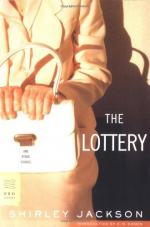|
This section contains 2,917 words (approx. 10 pages at 300 words per page) |

|
SOURCE: “‘The Lottery’: Symbolic Tour de Force,” in American Literature, Vol. 46, No. 1, March, 1974, pp. 100-07.
In the following essay, Nebeker analyzes the symbolism in “The Lottery.”
Numerous critics have carefully discussed Shirley Jackson's “The Lottery” in terms of the scapegoat traditions of anthropology and literature, pointing out its obvious comment on the innate savagery of man lurking beneath his civilized trappings. Most acknowledge the power of the story, admitting that the psychological shock of the ritual murder in an atmosphere of modern, small-town normality cannot be easily forgotten. Nevertheless, beneath the praise of these critics frequently runs a current of uneasiness, a sense of having been defrauded in some way by the development of the story as a whole.
Virgil Scott, for example, writes that “… the story leaves one uneasy because of the author's use of incidental symbolism … the black box, the forgotten tuneless chant, the ritual salute...
|
This section contains 2,917 words (approx. 10 pages at 300 words per page) |

|


